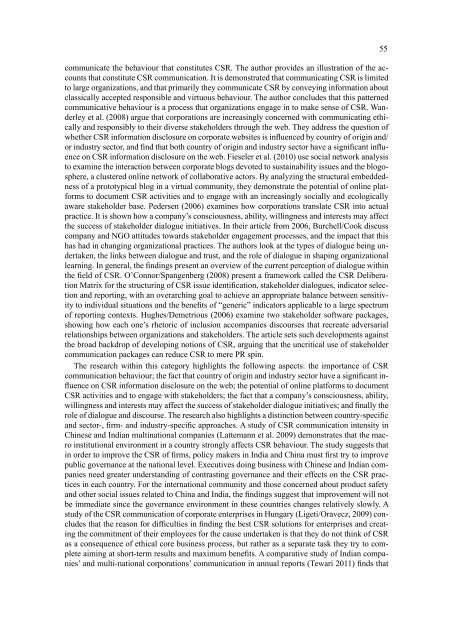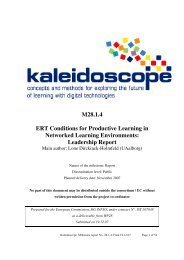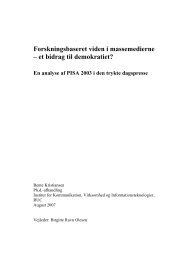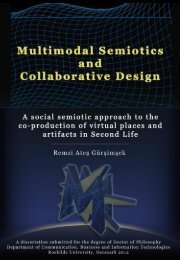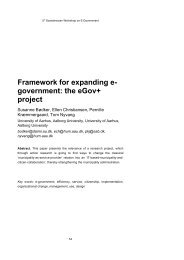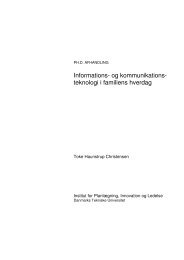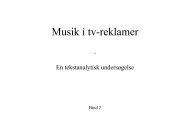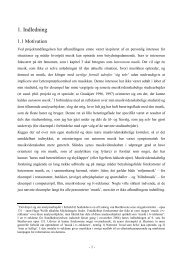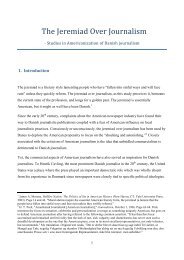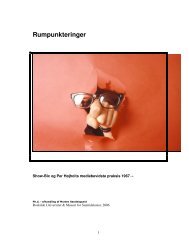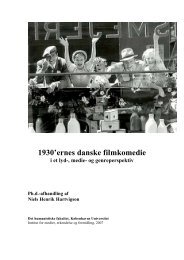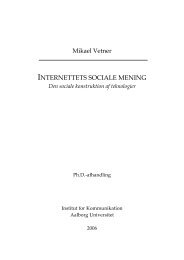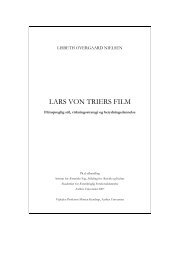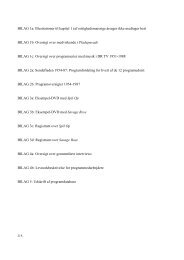Download - Hermes - Journal of Linguistics
Download - Hermes - Journal of Linguistics
Download - Hermes - Journal of Linguistics
Create successful ePaper yourself
Turn your PDF publications into a flip-book with our unique Google optimized e-Paper software.
communicate the behaviour that constitutes CSR. The author provides an illustration <strong>of</strong> the accounts<br />
that constitute CSR communication. It is demonstrated that communicating CSR is limited<br />
to large organizations, and that primarily they communicate CSR by conveying information about<br />
classically accepted responsible and virtuous behaviour. The author concludes that this patterned<br />
communicative behaviour is a process that organizations engage in to make sense <strong>of</strong> CSR. Wanderley<br />
et al. (2008) argue that corporations are increasingly concerned with communicating ethically<br />
and responsibly to their diverse stakeholders through the web. They address the question <strong>of</strong><br />
whether CSR information disclosure on corporate websites is influenced by country <strong>of</strong> origin and/<br />
or industry sector, and find that both country <strong>of</strong> origin and industry sector have a significant influence<br />
on CSR information disclosure on the web. Fieseler et al. (2010) use social network analysis<br />
to examine the interaction between corporate blogs devoted to sustainability issues and the blogosphere,<br />
a clustered online network <strong>of</strong> collaborative actors. By analyzing the structural embeddedness<br />
<strong>of</strong> a prototypical blog in a virtual community, they demonstrate the potential <strong>of</strong> online platforms<br />
to document CSR activities and to engage with an increasingly socially and ecologically<br />
aware stakeholder base. Pedersen (2006) examines how corporations translate CSR into actual<br />
practice. It is shown how a company’s consciousness, ability, willingness and interests may affect<br />
the success <strong>of</strong> stakeholder dialogue initiatives. In their article from 2006, Burchell/Cook discuss<br />
company and NGO attitudes towards stakeholder engagement processes, and the impact that this<br />
has had in changing organizational practices. The authors look at the types <strong>of</strong> dialogue being undertaken,<br />
the links between dialogue and trust, and the role <strong>of</strong> dialogue in shaping organizational<br />
learning. In general, the findings present an overview <strong>of</strong> the current perception <strong>of</strong> dialogue within<br />
the field <strong>of</strong> CSR. O’Connor/Spangenberg (2008) present a framework called the CSR Deliberation<br />
Matrix for the structuring <strong>of</strong> CSR issue identification, stakeholder dialogues, indicator selection<br />
and reporting, with an overarching goal to achieve an appropriate balance between sensitivity<br />
to individual situations and the benefits <strong>of</strong> “generic” indicators applicable to a large spectrum<br />
<strong>of</strong> reporting contexts. Hughes/Demetrious (2006) examine two stakeholder s<strong>of</strong>tware packages,<br />
showing how each one’s rhetoric <strong>of</strong> inclusion accompanies discourses that recreate adversarial<br />
relationships between organizations and stakeholders. The article sets such developments against<br />
the broad backdrop <strong>of</strong> developing notions <strong>of</strong> CSR, arguing that the uncritical use <strong>of</strong> stakeholder<br />
communication packages can reduce CSR to mere PR spin.<br />
The research within this category highlights the following aspects: the importance <strong>of</strong> CSR<br />
communication behaviour; the fact that country <strong>of</strong> origin and industry sector have a significant influence<br />
on CSR information disclosure on the web; the potential <strong>of</strong> online platforms to document<br />
CSR activities and to engage with stakeholders; the fact that a company’s consciousness, ability,<br />
willingness and interests may affect the success <strong>of</strong> stakeholder dialogue initiatives; and finally the<br />
role <strong>of</strong> dialogue and discourse. The research also highlights a distinction between country-specific<br />
and sector-, firm- and industry-specific approaches. A study <strong>of</strong> CSR communication intensity in<br />
Chinese and Indian multinational companies (Lattemann et al. 2009) demonstrates that the macro<br />
institutional environment in a country strongly affects CSR behaviour. The study suggests that<br />
in order to improve the CSR <strong>of</strong> firms, policy makers in India and China must first try to improve<br />
public governance at the national level. Executives doing business with Chinese and Indian companies<br />
need greater understanding <strong>of</strong> contrasting governance and their effects on the CSR practices<br />
in each country. For the international community and those concerned about product safety<br />
and other social issues related to China and India, the findings suggest that improvement will not<br />
be immediate since the governance environment in these countries changes relatively slowly. A<br />
study <strong>of</strong> the CSR communication <strong>of</strong> corporate enterprises in Hungary (Ligeti/Oravecz, 2009) concludes<br />
that the reason for difficulties in finding the best CSR solutions for enterprises and creating<br />
the commitment <strong>of</strong> their employees for the cause undertaken is that they do not think <strong>of</strong> CSR<br />
as a consequence <strong>of</strong> ethical core business process, but rather as a separate task they try to complete<br />
aiming at short-term results and maximum benefits. A comparative study <strong>of</strong> Indian companies’<br />
and multi-national corporations’ communication in annual reports (Tewari 2011) finds that<br />
55


